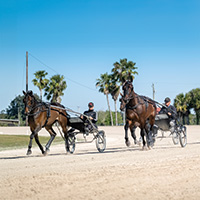 Snowbirds about to race North
Snowbirds about to race North
STORY BY PIETER VANBENNEKOM (Week of April 4, 2024)
As the annual migration of snowbirds back to their northern homes gets underway, most seasonal Vero Beach residents may not be aware that they will be joined on the journey by a sizable contingent of four-legged colleagues – Standardbred horses who have been trained here during the winter and will now begin their trek to the harness racing tracks in the Northeast where they will compete for fame and fortune.
Vero Beach boasts what co-owner Ove Bender immodestly – but probably accurately – describes as “the best training facility in Florida” for Standardbreds, a 64-acre spread at 66th Avenue and 53rd Street known as the Palema Trotting Camp, which the Bender family co-owns with fellow-Swede Ake Svanstedt, who was honored last year as harness racing’s Trainer of the Year at a big ceremony in Orlando.
The Benders and the Svanstedts have owned homes on the barrier island, down the street from each other on Live Oak Road in Riomar, for more than a decade. They say they love Vero Beach because its cleanliness reminds them of Sweden, and it’s not overpopulated – another similarity with their native country.
There are other horse training facilities for Standardbreds around Florida in places like Orlando, Ocala and Pompano Beach where horses can train all winter long in our mild weather for the summer racing season up north, but Bender said some horse owners have left those facilities to come to Vero Beach because “we have the best.”
The summer harness racing season at the 17 tracks around New York, New Jersey, Pennsylvania, Delaware and Kentucky starts in May, and Bender and Svanstedt have high hopes for some of the horses they have trained at Palema Trotting’s 1,000-meter track for the past few months.
They have the track record to be optimistic. Bender himself won harness racing’s blue-ribbon race, the annual Hambletonian held in the first week of August at the Meadowlands, with Alf Palema in 1992, and more recently, Team Svanstedt won the same race twice, once in 2017 with Perfect Spirit and again in 2021 with Captain Corey. Svanstedt has won more than 7,000 races during his 40-year career, 30 of those years in his native Sweden. He jokingly says that amounts to “a lot of flowers,” since winners there get flowers instead of medals.
Harness racing is a totally different sport from Thoroughbred racing. In harness racing, no jockey rides on top of the horse; instead, the horse pulls a lightweight, two-wheeled vehicle called a sulky in which the driver sits. Drivers do not need to be as small as jockeys as the driver’s body weight in the sulky doesn’t make much difference to the trotting horse.
In Europe, harness racing is big in the Scandinavian countries and in Italy, while in France, it’s equally as popular as Thoroughbred racing. While Thoroughbred racing may be considered slightly more glamorous than harness racing in the U.S., and the winning purse at the Kentucky Derby may be larger than first prize at the Hambletonian, that race is still worth a cool $1 million to the winner.
While 100,00 people can flock to a Triple Crown Thoroughbred race, the Hambletonian may draw about 20,000 spectators.
Both Bender and Svanstedt have been around horses their whole lives and love the animals but they’ve always preferred Standardbreds to Thoroughbreds. “Our trotter horses are much nicer to work with,” Bender says. “Thoroughbreds tend to be more temperamental.”
Palema Trotting has 29 different paddocks and 107 boxes, meaning that every season, more than 100 horses can be trained here – mostly as trotters, a few as pacers – and readied for the northern racing season. Bender and Svanstedt bought the property in 2010 when it was a showplace for jumping horses, and have since added most of the stables and other facilities as well as living quarters for trainers, some of whom also come from Sweden.
Bender has been coming to Florida for many years as he owned a roofing tile factory in the Ocala area. Originally, he looked at a winter home in the Miami area, but found South Florida traffic too busy and chaotic and came to Vero Beach instead on the recommendation of a friend. He never looked back and hasn’t once regretted his decision to build a home here.
As a businessman, Bender readily admits that manufacturing roofing tiles is a more profitable venture than training horses. He sometimes wonders if the horses are more of a hobby than a business. “If you want to make a lot of money, you shouldn’t be in the horse racing business, but we do it for the love of the horses,” he says. “We find it inspiring. It makes us happy. Of course, we’re happier if our horses win.”
Still, the trotter training facility brought in almost $10 million last year, which was nothing to sneeze at.
At last year’s auction, about 950 yearling Standardbreds came up for sale, and the average selling price was about $90,000. It costs between $60,000 and $80,000 to train a horse for a season and get it ready for racing at a facility like Palema Trotting in Vero Beach, so horse owners can be $150,000 in the hole before they can earn back even a penny from race winnings.
Thoroughbred racing has been plagued by horse-doping scandals for a number of years, resulting in suspensions for even the most famous trainers in the sport, and harness racing has not been immune from rumors of similar chicanery.
Bender says he knows there is a five-year FBI investigation ongoing into horse-doping in harness racing and he praises all efforts to “clean up the sport.” He adds that the Meadowlands, the sport’s main track, has admirably taken the lead in the cleanup efforts.
Free from doping allegations, the trainers at Palema can still focus more on friendly rivalries among themselves. Svanstedt’s main rival may be his own wife, Sarah, also a trainer and driver, who actually has a higher winning percentage across all their races.
They have a friendly bet going between the two of them that he has to cook dinner if she wins, but his repertoire as a chef isn’t very extensive. Every time she won, she’d have to eat spaghetti and meatballs again. “I was getting pretty tired of that same dinner all the time, so sometimes I let him win,” she joked.
Are there any drawbacks to training horses in Florida? “Well, we did see a big alligator once in one of the ponds on our property,” says Ulrica Bender. “We called the wildlife authorities. They caught him and took him away – to the Everglades, I think. We still have a smaller gator living here right now. He wanders between our two ponds and another pond on a neighbor’s property. But the horses never see him, so they don’t get spooked.”



